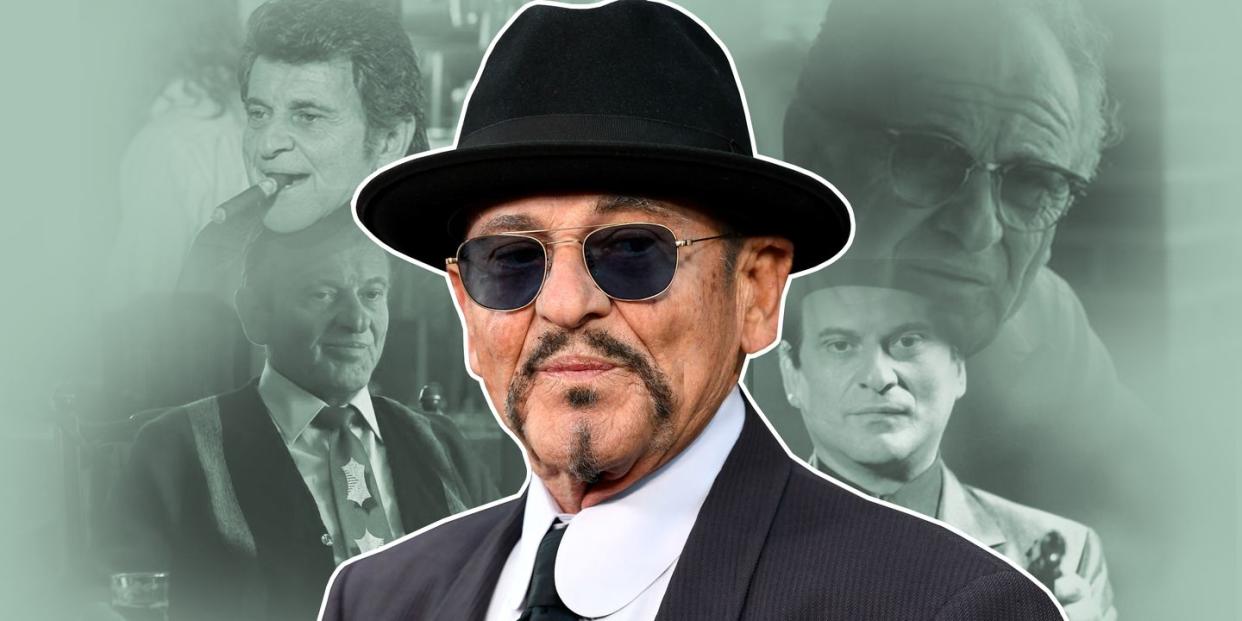Any Time Is a Good Time to Celebrate Joe Pesci

- Oops!Something went wrong.Please try again later.
- Oops!Something went wrong.Please try again later.
- Oops!Something went wrong.Please try again later.
Joe Pesci is not recently deceased, retired, or back with a new role. To the best of my knowledge, none of his quintessential screen performances are coming up on a major anniversary. He turns 80 today, but that’s not the reason he was celebrated in a recent series, “Also Starring… Joe Pesci,” at New York’s Metrograph Theater. No, what the theater’s programmers understood—and what drew me to the series—was reflected in its underlying conceit: the career of Joe Pesci needs no occasion to be celebrated.
The “Also Starring” series was born out of a desire to highlight the work of Hollywood’s greatest supporting players, Pesci (its inaugural subject) being the platonic ideal: a second banana who would elevate, and often outmatch, the first. “I wanted to expand the scope of what we consider major contributions to cinema history with a new recurring series spotlighting actors with monumental bodies of work in supporting roles,” said Metrograph Programmer Lydia Ogwang. “Joe Pesci is the embodiment of the ethos of the series—an iconic, heavyweight performer with an unforgettable screen presence who consistently proved himself absolutely integral to the films he appeared in.”
Pesci officially retired from acting in 1999, though his loose adherence to hanging it up has meant that he hasn’t so much vanished as become scarce. In the ensuing years, he’s acted in Robert De Niro’s The Good Shepherd (2006), Taylor Hackford’s Love Ranch (2010), and, most notably, Martin Scorsese’s The Irishman (2019). He’s also appeared in a couple memorable commercials, and in 2016 was briefly the toast of late night when a pre-scandal Louis C.K. recounted a story of Pesci telling him to quit comedy. Besides his sporadic reemergence, Pesci remains so frequently quoted that he feels more present than he actually is. He’s not an actor in need of rediscovery or reappraisal. Instead, over the course of six films—Casino, Goodfellas, Easy Money, Eureka, The Irishman, and My Cousin Vinny—Metrograph’s series essentially racks focus, filtering these films through the prism of Pesci.
When you watch them that way, a few things become clear. The first is the degree to which Pesci was the engine that powered Scorsese’s mob movies. Robert De Niro may have been Marty’s go-to leading man, but no one matched his camera’s frenetically zooming and swooping energy better than Pesci. In Goodfellas, and even more so in Casino, Pesci brings an unrelenting, gonzo heat, burning, burning, burning, and always threatening to combust. Despite his diminutive stature, he’s often the scariest person in the room thanks to his volatility and speed of attack. He makes humor and rage two sides of the same coin, inflecting jokes with a sense of unease and violence with a psychopathic flippancy. In a single scene, he could communicate both the allure of the mob—the laughs, the fun!—and its toxicity. Who else packed such charisma and menace?
That Pesci often played characters who combined those two qualities (wisecrackers and firecrackers) obscured the range necessary to hit both notes—and hit both notes in quick succession. Unlike many of Hollywood’s other legendary supporting actors, Pesci was never chameleonic—there’s always some trace of that squeaky voice, that puckered face, and that inner dynamism. But conversely, he has always been versatile, with the potential to be alluringly reserved (The Irishman) or fantastically campy (Eureka), to play both children’s movie villains and action blockbuster fools. He could broaden his schtick for a studio comedy or ground it for a prestige drama. And when he was finally given the chance, he proved what should have been evident all along given his megawatt presence: that he was a star in his own right.
The final screening of “Also Starring… Joe Pesci” was, naturally, My Cousin Vinny. Look, has any 30-plus-year-old studio comedy aged better? At its core, Vinny fuses two conventional movies—the fish-out-of-water comedy and the court procedural—hitting all the narrative beats they’ll teach you in Screenwriting 101. But the beauty of the movie lies in all the ways it’s unconventional—which begin with its leads, Pesci as Vincent Gambini and Marisa Tomei as Mona Lisa Vito. Studio executives didn’t want either actor, and you can’t entirely blame them. Beyond her lack of credentials and his not exactly looking like a matinee idol, there was the issue of their ages: he was old enough to play her dad. Though the age gap is bridged somewhat by a wig that pulled his skin back.) (They shouldn’t make sense together, but go ahead, name two actors with greater chemistry. The reason, I think, that Pesci and Tomei gel so well is that they speak the same language. Which is, of course, sarcasm. The delight they both take in ribbing each other is palpable. Sexy, even. With the slightest modulation, the same volubility that made Pesci frightening as a mobster made him charming as a lawyer and lover.
And yet, watching the movie, laughing there with a packed house, another thing that became clear was that it wasn’t just Pesci that left the movies, it was the movies that left Pesci. I’m hardly nostalgic for the Hollywood of yore, but it’s hard to fathom a My Cousin Vinny getting made today unless it was literally called My Cousin Vinny II. There aren’t many modern movies that jump out as natural Pesci vehicles, either. (I’m sure the Safdies could find a role for him, though.) Maybe there never really were. But the absence of Pesci in today’s cinema is exacerbated by the absence of young Pescis. Who today combines his operatic bravado, quick wit, short fuse, and authentically working class aura? Each actor I think of—Jonah Hill, Keke Palmer, Adam Sandler—lacks at least one dimension. You know, I guess that’s just testament to Pesci’s talent.
You Might Also Like

